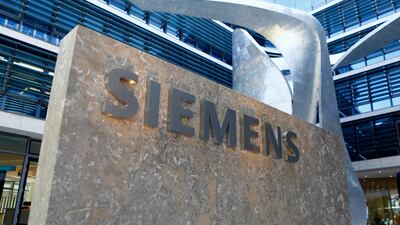Germany's industrial giant Siemens will work with Iraq’s KAR Group to help the Kurdistan region generate more power after the company reported a downturn in its orders over the three months ending in June.
The German company said on Monday that it had widened the scope of its existing service agreement with KAR to provide further operations and maintenance for two newly added generators at the Khormala power plant in Kurdistan.
The plant supports "the development goals of the Kurdistan region,” said Gianluigi Di Giovanni, senior executive vice president of Siemens power Generation Services in the Middle East. “That’s why we are proud to expand our collaboration with KAR to deliver reliable and stable electricity supply to people’s homes.”
The gas-fired plant, totaling around 930 megawatts, makes up nearly 30 per cent of the electricity demand and supplies more than three million people with power. Siemens said that the service extension will help improve operational flexibility and performance of the gas turbines for the next 15 years.
_______________
Read more:
New Iraq chief for Taqa as first Kurdish region oil nears
Iraqi oil exports declining this month
_______________
In 2013, Siemens installed four gas turbines and four generators valued at €100 million. However, in the firm’s last quarterly earnings for the three months ending in June, Siemens said orders dropped 6 per cent “due to sharply lower volume from large orders” in its power and gas segment.
Siemens said that global energy trends continued to reduce overall demand in markets for the division’s offerings. Orders for the power and gas division dropped by 41 per cent to 2,674, which resulted in profits and revenues declining 23 per cent and 12 per cent respectively.
_______________
Read more:
Siemens to set up global logistics headquarters in Dubai
Siemens halts sale of power turbines to Russia
_______________
Kurdistan’s electricity generation capacity has increased five-fold to nearly 3 gigawatts, up from 482MW a decade earlier. The regional government said that another 3GW could be added to the power grid “in the near future”.
About US$1.5 billion has been invested in the regional government's power sector, using dual-fuel gas turbines that can run on either gas or diesel, according to official data.
There is however a bigger emphasis on gas, given the proximity and ease of extraction from Khor Mor, Khurmala and other fields. That “has resulted in a reliable, scalable and fast-track power generation programme," the government said in a statement on its website. "With the planned expansion in gas production, other new power stations will be supplied with gas through the growing regional gas grid.”

